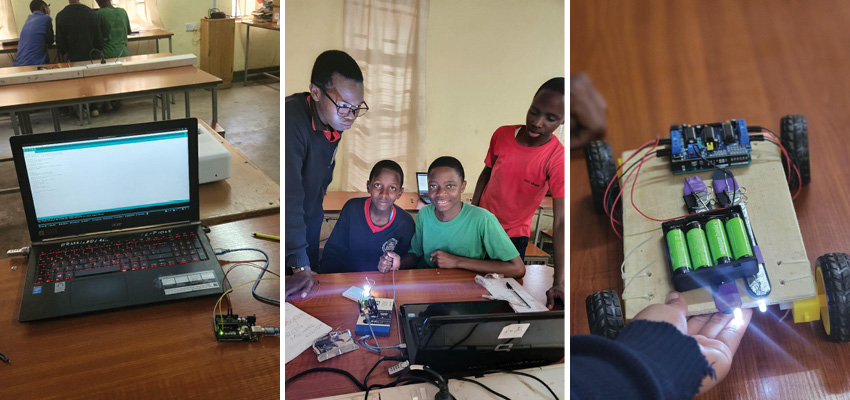
Serial.println(“Hello Arduino Car!”): Developing a curriculum for students aged 15-17 to support the science and technology department in learning about microcontrollers and their possible applications with sensors, Bluetooth, and a battery-controlled car.
MIT D-Lab class
Student team
- Serenity Truth (Wellesley College, ‘25)
- Lianne Quaynor (Wellesley College, ‘24)
Country
Tanzania
Community partners
- Witness Shangali
- John Nizira
- Luqman
Edmund Rice Sinon Secondary School
- David George
- Zephania Mkaika
Opportunity driving the project
We had weekly meetings with our partners and identified that students were interested in learning about tech innovation, entrepreneurship, sensors, and project management to be able to solve problems in their communities and work in government. We wanted a curriculum and an opportunity that engaged the students' interests to keep them intrigued and to seek more education.
Cultural context
When Tanzania gained independence in 1961, education leaned more toward vocational training, but it improved from 1995 to the present (Opalo, 2022). Today, Tanzanian educators and politicians made primary and secondary schools universal, infused African culture and history, taught Swahili, prepared students for higher levels of education, and focused on skill development for the workforce and open economy (Opalo, 2022).
Theory of change
We hope to inspire more inventions that can solve problems in their community and utilize what we learned, either technical aspects to start projects, improve upon current projects such as an incubator and free energy circuit, or more objectives such as preserving computer skills, teamwork, and leadership.
Curriculum
Our curriculum spanned two days with 20 students for five hours each day. We did the workshop twice, once with form 4 and again with forms 3 and 5.
Day 1: Introduction to circuits and Arduino
- The students made flashlights that functioned to turn off and on when the circuit is complete with their paper clip or binder clip. We taught them the components of an Arduino, binary code, and digital and analog output. We had them copy and find the “Blink” activity code so the LED on the Arduino blinks at a certain speed. Then we had them copy the code for a “Hello World” activity, when uploaded to the Arduino app, the phrase is printed in the serial monitor for the students to see.
Day 2: Introduction to sensors and building the “Arduino Car”
- They used the Arduino to learn about touch, ultrasonic, buzzer, and speaker sensors. They found the code on their own and we worked them through some of the technical aspects such as the pins and error codes. We showed them how to use them to connect the Bluetooth module HC-05 to the Arduino and had them try to turn the multi-colored LED on or off using the app Arduino BlueControl on the Samsung phone. Lastly, we built and programmed the automatic Arduino Car, connected batteries to it, and then raced all the cars against each other outside.
Slides presenting the curriculum.
Next steps
Use the Bluetooth module (HC-05) and the Samsung Phone to make the Arduino Car move when we connect the Bluetooth module to the phone using an app, either the app we developed on MIT App Inventor or Arduino BlueController through Google Play Store. Then include a day for students to have the opportunity to integrate the projects they have been working on and to give them ideas for future projects based on their interests or to start a project based on their interests, such as technology for the disabled.
Bibliography
Opalo, K. (2022). What is the Point of Schooling? The Politics of Education Policy in Tanzania Since 1961. https://www.cgdev.org/sites/default/files/what-point-schooling-politics-education-policy-tanzania-1961.pdf
Contact
Heewon Lee, MIT D-Lab Lecturer and Research Associate

